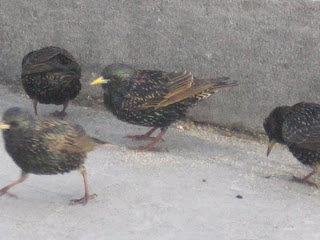 News and links about birds, birding, and the environment.
News and links about birds, birding, and the environment.
- This weekend, starting today, is the Great Backyard Bird Count. See my posts on the subject here and here. The count has received newspaper coverage from the Asheville Citizen-Times, the Cleveland Plain Dealer, the Orangeburg Times and Democrat, and the Fort Mill Times.
- A recent study suggests that wind farms at sea may be safe for seabirds. Land-based wind farms still face safety questions. A wind farm has been proposed for Virginia's Highland County.
- Following Nature Canada filing a lawsuit to protect piping plovers, the Canadian government has agreed to create new protection plans for piping plovers and other endangered species. The point in contention was that the old plans did not identify critical habitat, as required by law.
- The RSPB is pushing back against blaming wild birds for H5N1 outbreaks on poultry farms. In the recent case of an outbreak at a sealed turkey pen in Sussex, officials speculated that a wild bird somehow flew through a ventilation shaft to spread the virus. More background here. Meanwhile, tests on over 74,000 wild birds in North America have shown no trace of the disease.
- Some large Mediterranean bats may prey on birds that migrate at night.
- The U.S. Conference of Catholic Bishops sent a letter to members of Congress to urge action on climate change. (Via Treehugger.)
- A study found that people aged 50-64 have the largest "carbon footprint," but also feel the most strongly that government needs to take action to limit carbon emissions.
- Warming in the Antarctic is reducing krill populations and forcing penguins to move farther south.
- Birds Etcetera has a PSA about sign posts and raptors.
- A proposed development is threatening important habitat for the endangered Grenada dove. The government of Grenada proposes to sell national park land to the Four Seasons hotel chain for a new resort.
- Two red-tailed hawks in Wisconsin temporarily lost the ability to fly after they fell into a stream and ice formed on their wings. The birds are flying again now that the local humane society warmed them overnight.



